【最新】牛津译林版七年级英语下册Unit3 Welcome to Sunshine Town单元测试卷(附答案)
牛津译林版七年级英语下学期Unit 3 Welcome to Sunshine Town提优版讲义
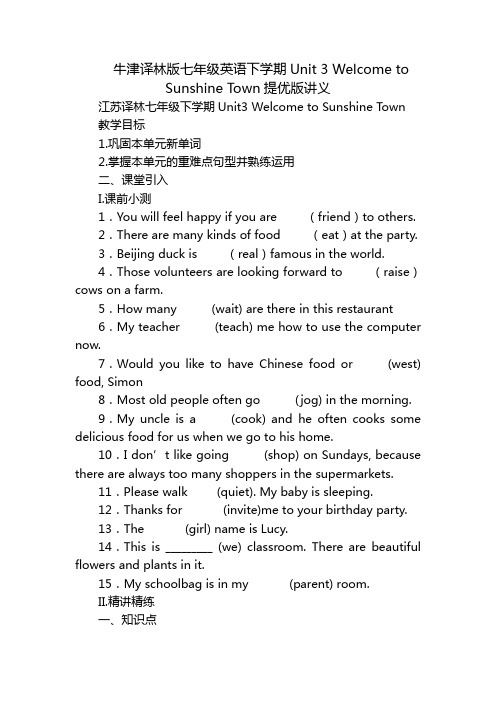
牛津译林版七年级英语下学期Unit 3 Welcome toSunshine Town提优版讲义江苏译林七年级下学期Unit3 Welcome to Sunshine Town教学目标1.巩固本单元新单词2.掌握本单元的重难点句型并熟练运用二、课堂引入I.课前小测1.You will feel happy if you are (friend)to others.2.There are many kinds of food (eat)at the party.3.Beijing duck is (real)famous in the world.4.Those volunteers are looking forward to (raise)cows on a farm.5.How many (wait) are there in this restaurant6.My teacher (teach) me how to use the computer now.7.Would you like to have Chinese food or (west) food, Simon8.Most old people often go (jog) in the morning.9.My uncle is a (cook) and he often cooks some delicious food for us when we go to his home.10.I don’t like going (shop) on Sundays, because there are always too many shoppers in the supermarkets.11.Please walk (quiet). My baby is sleeping.12.Thanks for (invite)me to your birthday party.13.The (girl) name is Lucy.14.This is _________ (we) classroom. There are beautiful flowers and plants in it.15.My schoolbag is in my (parent) room.II.精讲精练一、知识点comic strip & Welcome to the unit知识点1.An old friend of mine is coming to see me.我的一个老朋友要来看我。
牛津译林版七年级下册Unit 3《Welcome to Sunshine Town》(Study s

牛津译林版七年级下册Unit 3《Welcome to Sunshine Town》(Study skills)教学设计一. 教材分析《Welcome to Sunshine Town》是牛津译林版七年级下册Unit 3的一篇课文,主要介绍了阳光镇的环境、设施和居民生活。
本课内容贴近学生生活,有助于激发学生学习英语的兴趣。
通过本课的学习,学生能够掌握相关词汇和句型,提高听说读写能力。
二. 学情分析七年级的学生具有一定的英语基础,对新鲜事物充满好奇。
但部分学生可能在听说方面存在困难,需要教师给予更多的关注和指导。
在课堂上,教师应充分调动学生的积极性,鼓励他们主动参与学习。
三. 教学目标1.知识目标:学生能够掌握课文中的相关词汇和句型,理解课文内容。
2.能力目标:学生能够运用所学词汇和句型进行简单的交流,提高听说读写能力。
3.情感目标:学生能够培养对美好环境的向往,增强环保意识。
四. 教学重难点1.重点:课文中的词汇和句型。
2.难点:课文的理解和运用。
五. 教学方法1.情境教学法:通过设定真实的生活情境,让学生在实际环境中学习英语。
2.任务型教学法:引导学生参与各种任务,提高实际运用英语的能力。
3.游戏教学法:通过趣味游戏,激发学生的学习兴趣,巩固所学知识。
六. 教学准备1.教学课件:制作课件,展示课文内容和相关词汇。
2.教学素材:准备相关的图片、视频等素材,辅助教学。
3.课堂活动:设计多样的课堂活动,激发学生的学习兴趣。
七. 教学过程1.导入(5分钟)利用课件展示阳光镇的美景,引导学生谈论自己对美好环境的向往。
教师用简单英语进行引导,激发学生的学习兴趣。
2.呈现(10分钟)教师展示课文标题《Welcome to Sunshine Town》,引导学生预测课文内容。
然后播放课文动画,让学生初步感知课文内容。
3.操练(15分钟)学生跟读课文,模仿语音语调。
教师抽取学生进行角色扮演,表演课文内容。
同时,教师引导学生运用课文中的句型进行互动交流。
牛津译林七年级下册英语Unit 3 Welcome to Sunshine Town Grammar
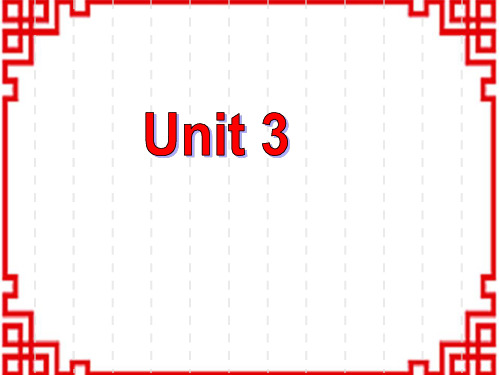
It is Minnie’s cap. This cap isMinnie’s .
belongs to our school
a football field It is our school’s football field. This football field is our school’s.
We add ’s to plural nouns that do not end in -s. children’s people’s men’s women’s
We often use ’s with names. Neil’s mother is calling him from the UK.
Sandy’s. _M__y_ book is under Sandy’s chair. Sandy: Yes. And _y_o_u_r_s is here too, Simon.
Simon: What about that book, Sandy? Is it _y_o_u_r_s?
Sandy: No. It’s Millie’s. Daniel: Oh, yes, it’s _h_e_r_s_, and here is
theirs.
Whose books are they?
Daniel: Look at our books. They’re all over the place.
Millie: Are those _y_o_u_r_ books, Amy? Amy: No, they aren’t _m__in__e_. They’re
belong to the twins
They are the twins’ T-shirts. These T-shirts are the twins girls
牛津译林版英语七下Unit 3《Welcome to Sunshine Town》(Welcome

牛津译林版英语七下Unit 3《Welcome to Sunshine Town》(Welcome to the unit)教学设计一. 教材分析牛津译林版英语七下Unit 3《Welcome to Sunshine Town》主要介绍了阳光镇的自然风光、人文景观以及当地居民的生活。
本单元以任务型教学法为主线,通过各种语言活动,引导学生学习英语的同时,了解和欣赏美丽的阳光镇。
教材内容丰富,插图生动,激发学生学习兴趣。
二. 学情分析七年级学生已具备一定的基础英语能力,能运用简单的英语进行日常交流。
但部分学生对英语学习仍存在恐惧心理,缺乏自信心。
针对这一情况,教师应充分调动学生的积极性,营造轻松愉快的学习氛围,帮助学生树立学习英语的信心。
三. 教学目标1.知识目标:学生能掌握阳光镇的相关词汇和表达方式,如自然风光、人文景观、当地居民等。
2.能力目标:学生能运用所学的词汇和句型,介绍自己所在的城市或乡村,并进行简单的交流。
3.情感目标:通过学习,学生能感受到阳光镇的魅力,培养对美丽家园的热爱之情。
四. 教学重难点1.重点:掌握阳光镇相关词汇和表达方式。
2.难点:运用所学的词汇和句型,进行实际交流和介绍。
五. 教学方法1.任务型教学法:通过各种语言活动,让学生在实际操作中学习英语。
2.情境教学法:设置真实的情境,让学生在具体环境中感受和运用英语。
3.交际教学法:鼓励学生积极参与交流,提高实际运用英语的能力。
六. 教学准备1.教学PPT:制作包含阳光镇图片、词汇和句型的PPT,以便于教学展示。
2.教学素材:准备相关文章、视频等素材,丰富教学内容。
3.作业布置:提前布置相关预习作业,让学生对阳光镇有所了解。
七. 教学过程1.导入(5分钟)利用PPT展示阳光镇的美丽图片,引导学生谈论自己对阳光镇的初步印象。
同时,教师简要介绍阳光镇的自然风光、人文景观和当地居民的生活。
2.呈现(10分钟)教师展示PPT,引导学生学习阳光镇的相关词汇和表达方式,如mountn、river、old bridge等。
【最新】牛津译林版七年级英语下册Unit3 Welcome to Sunshine Town!精品课件
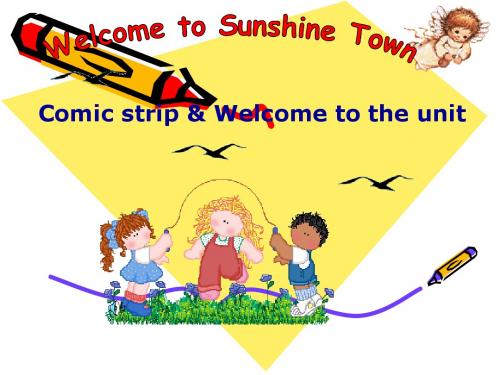
=there are none How many apples are there?
There isn’t any milk =there is no milk 对None的提问用 =there is none How many/ much how much milk is there
None of ….中没有一个 None of+可数名词复数+谓语(单/复)
What’s the man doing? He is ordering his food.
At lunchtime in a restaurant
What would you like?
Order sth. 点菜
Fish is healthy. let’s order some. And some potatoes, please.
what Nobody 指人 提问用 who
Nothing 指物,提问用
How many/ much
What’s on the table?
Nothing Who is in the room Nobody/ no one
How many girls come from Yz None
Who is in the classroom
1.I often go shopping in a _______ shopping mall. sports centre. 2.Stephen often plays cinema. badminton at a sports ___ centre. 3.Nick likes eating shopping mall. Chinese food in a Chinese ___ restaurant. 4.If you enjoy watching films,you Chinese restaurant. can go to a _______ cinema.
【最新】牛津译林版七年级英语下册Unit3 welcome精品课件(共33张PPT)
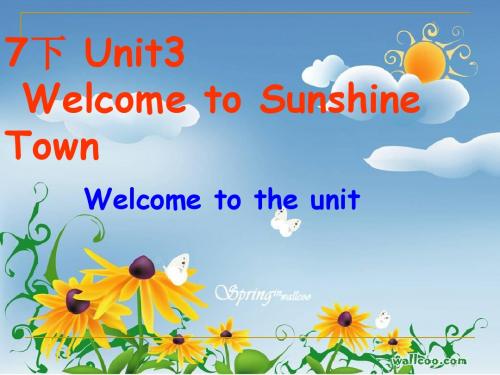
4. Good idea. 好主意。 是个好主意。 It's a good idea. 我有一个主意。 I have an idea.
Step 6 Comic strip: Lead-in
What does Eddie like doing?
Step 7 Language points:
男孩们热爱在足球场踢足球。
football field
Chinese food
Many foreign friends like eating Chinese food. 许多外国朋友喜欢吃中国食物。
What do you like/love/enjoy doing?
Step 3 Finish Part A on Page 31.
7下 Unit3 Welcome to Sunshine Town
Welcome to the unit
step1. presentation of new words
What’s the baby girl doing?
She is drinking s do sth.
What/How about doing sth? Shall we do sth?
Why not/don’t you do sth? Maybe we can…
2. Shall we invite them to have dinner with us?
invite sb. to do sth. 邀请某人做某事
[ai]
Chinese food Western food
New words:
mine nothing wait a minute yuan tin pizza exchange student
牛津译林版七年级下册Unit 3 Welcome to Sunshine Town reading
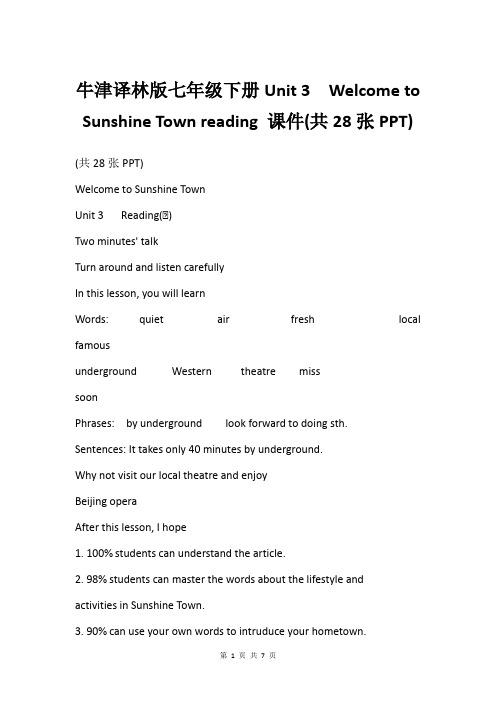
牛津译林版七年级下册Unit 3 Welcome to Sunshine Town reading 课件(共28张PPT) (共28张PPT)Welcome to Sunshine TownUnit 3 Reading(Ⅰ)Two minutes' talkTurn around and listen carefullyIn this lesson, you will learnWords: quiet air fresh local famousunderground Western theatre misssoonPhrases: by underground look forward to doing sth. Sentences: It takes only 40 minutes by underground.Why not visit our local theatre and enjoyBeijing operaAfter this lesson, I hope1. 100% students can understand the article.2. 98% students can master the words about the lifestyle andactivities in Sunshine Town.3. 90% can use your own words to intruduce your hometown.Where would you like to live, in a modern city, in a small town or in the countrysideWhyFree TalktowncitycountrysideSunshine Towntall buildingsfresh aira parkgreen hillstreeslakesa good place to go joggingbe close tothe center of Beijingbe not far (away) fromgo to the centre by undergroundbuy wonderful presents in the shopsChinese foodChinese restaurantsBeijing duck is very famous.Western restaurantsWestern foodlocal theatreBeijing OperaSelf-study :Finish Part B1Match the words on the left with the meanings on the right. Tips:1. No. 3 check answers in groups2. Read the words and the meanings in groups together.知者加速: Try to remember the meaning of each word.1. fresh2. local3. famous4. miss5. look forward tonot hear, see or have somethingb. very clean or coolc. feel happy because you are going to enjoy somethingd. known by many peoplee. ln the area near where you liveMatch the words with the meaningsTips: watch the video and answer the question.What can people do in Sunshine TownSelf-study: Watch and thinkTips: watch the video and answer the question.What can people do in Sunshine TownSelf-study: Watch and think1.stay in a quiet town2.go shopping3.eat Chinese food4.enjoy Beijing operae the to find the answers (ask and answer in pairs)Tips: 1.Read Para. 1 in groupsWould you like to stay in a quiet townSelf-study: Read and answer知者加速: Finish B2It takes only 40 minutes by underground.Local people like jogging in the park.The air is fresh.KEY WORDS1.What is the air like in the town2.What do local people like doing3.How far is it from the centre of BeijingWould you like to go shopping and eat Chinese foodSelf-study: Read and T or FTips: 1.Read Paragraphs 2 in the park.Go shopping: Buying wonderful for family and friends.Eat food: Beijing duck;Chinese food or food.Enjoy : Visiting the .FamousundergroundquietfreshjoggingpresentsNot farBeijing operaWesternlocal theatre知者加速:Write down an outline to introduce Xuzhou.Group work : Welcome to XuzhouMy friend Anna wants to visit Xuzhou, she doesn't know much about our city.Work in groups and try to introduce Xuzhou to Anna.Tips: 1.All the members should take part in it.2. No.1&2: more words, more pointsWelcome to our city, ... ………………………..……………………………………………………………………..……………………………………………………………………..Welcome to XuzhouLiving:Eating:Shopping:Enjoyment:Into the sunshine , 阳光下,Full of light , 充满着光辉,Full of nature , 充满着活力,Change every moment .时时变化。
牛津译林初中七年级下册英语 Unit 3 Welcome to Sunshine Town

I’dliketotaketheboystoour_______footballfield.
11. Therearelotsofniceshopsin____ his
(he) town.
12. Youcanbuywonderfulpresentsfor
__y_o_u_r(you) familyandfriendsthere.
1. Areyou__m_y(I) master? 2. _M_i_l_li_e_’s_(Millie) classmateDavidiswritingabouthisfavourit esport. parents’ 3. The_______ (parent) meetingbeginsattwoo’clockihnetrheafternoo n. 4. Millieseldyoomurchatswith___ (she) friendsafterclass. 5. Whatis_____ (you) favouritefetshteiviral, Tommy?
n. 笔盒,笔袋
Whosepenisthis? It’sLily’s.
1.Notethatitsandhishavetwofunctions. 2.Thebagoverthereishis. 3.Itishisbag. 4.2. Thepossessiveadjectiveitsdoesnot 5.haveanapostrophe (’). itsmeans 6.“它的,它的东西”. it’smeans “itis”. 7.Lookatthepoorlittledog. Thereis 8.somethingwrongwithoneofitslegs. 9.It’sasunnydaytoday.
牛津译林版七年级下unit3-welcome-to-Sunshine-Town-知识点及练习教学教材

2015年春季一加一教育七年级英语讲义(四)Unit 3 Welcome to Sunshine Town!编写人:蔡丹丹审核人:张万丽 2015/3/24Part I 预习热身一、重点短语1.我的一位老朋友___________________2. 交流学生______________________________3. 乘地铁__________________________4. 盼望,期待____________________________5. 离……不远______________________6. 等一会儿______________________________7. 西餐厅__________________________8. 当地的剧院____________________________9. 看一些精彩的电影________________ 10. 品尝一些中式食品______________________二、重点句子及点拨1.An old friend of mine is coming to see me,Hobo.an old friend of mine意为“____________________________________"。
在英语中冠词与物主代词不能同时放在同一个修饰词前,要表示“我的一个……"“他的两个……"则须用“冠词/数词+名词+of+名词性物主代词”结构。
如:吉姆的一支钢笔______________________________她的一本书__________________________________2.But there’s nothing in the fridgeNothing=not anythinge.g.: There is nothing in my box. = There is not anything in my box.★one, no one , 与nothing 的区别None: 可以指代人或者物,常与of 连用。
【最新】牛津译林版七年级英语下册《unit3 Welcome to Sunshine Towm》课件1
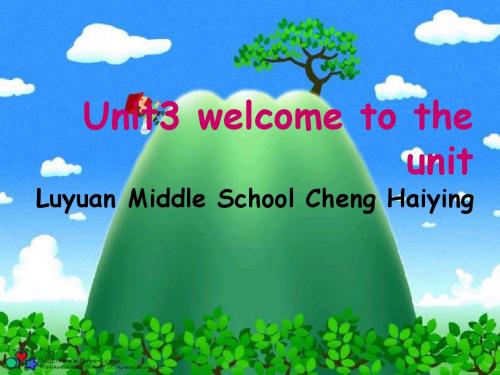
4
The Sunnyside Garden
the KFC
the Zoo
Sunshine Hospital
The Lake Park
Where are Eddie and Hobo?
What does Hobo ask Eddie to do in the picture ?
He asks him to go down the hill.
Listen and answer
Do they have to go up the hill again?
Yes, they do.
Does Hobo really know the way?
No, he doesn’t.
Read and act
north
west
east
south
Play games
The Sunnyside Garden
the Zoo
The Lake Park
1、The Zoo is north of Beijing Sunshine Secondary school. ( 3 ) 2、The Sunnyside Garden is north-west of the Zoo. ( 5 ) 3、The Lake Park is south-west of Beijing Sunshine Secondary School.( 7 )
The class1,Grade7students are planning a spring outing.But they don’t know where they are and how to go e. Let’s help them find the places they want to visit in the map. Then write the numbers.
牛津译林版英语七下Unit 3《Welcome to Sunshine Town》(Study sk

牛津译林版英语七下Unit 3《Welcome to Sunshine Town》(Study skills)教学设计一. 教材分析《Welcome to Sunshine Town》是牛津译林版英语七年级下册Unit 3的一篇阅读文章,主要介绍了Sunshine Town的自然风光、人文景观以及当地居民的生活。
文章内容丰富,语言简洁易懂,贴近学生的生活实际。
通过学习本文,学生可以提高自己的阅读理解能力,学习到如何描述一个地方的特点和人们的生活。
二. 学情分析七年级的学生已经掌握了一定的英语基础知识,具备一定的阅读理解能力。
他们对新鲜事物充满好奇,喜欢探索和发现。
然而,部分学生可能在词汇量和语言表达能力上有所欠缺,需要老师在教学中给予关注和引导。
三. 教学目标1.知识目标:–学生能够掌握文章中涉及的新词汇和短语。
–学生能够理解文章的主旨大意,概括文章内容。
2.能力目标:–学生能够运用所学词汇和短语描述一个地方的特点和人们的生活。
–学生能够在阅读过程中运用预测、扫描等阅读策略。
3.情感目标:–学生能够激发对美好地方的向往之情,培养积极的生活态度。
四. 教学重难点•学生能够掌握文章中涉及的新词汇和短语。
•学生能够理解文章的主旨大意,概括文章内容。
•学生能够运用所学词汇和短语描述一个地方的特点和人们的生活。
•学生能够在阅读过程中运用预测、扫描等阅读策略。
五. 教学方法1.任务型教学法:通过设定各种任务,激发学生的学习兴趣,提高学生的参与度。
2.合作学习:学生分组讨论,培养学生的团队协作能力和沟通能力。
3.启发式教学:教师引导学生思考,激发学生的创新意识。
4.读写结合:在读的过程中,引导学生进行写作练习,提高学生的综合运用能力。
六. 教学准备1.教师准备:–熟悉教材内容,明确教学目标。
–制作课件和教学辅助材料。
–设计各种教学活动和任务。
2.学生准备:–预习教材,了解文章内容。
–复习相关词汇和短语。
七. 教学过程1.导入(5分钟)–教师通过展示图片或视频,引导学生谈论自己喜欢的地方,激发学生的学习兴趣。
牛津译林版七年级英语下册《Unit 3 Welcome to Sunshine Town Task》

《Unit 3 Welcome to Sunshine Town Task》教案年级七年级科目英语课题7B Unit 3 Welcometo Sunshine TownTask课时 1 课型new 授课时间教学目标To get to learn more words ,phrases and sentences To try to write your hometown重点hear do sth/some…, and others…/raise cows/grow wheat难点hear do sth/some…, and others…/raise cows/grow wheat教学准备Multim edia;教学设计详案二次备课内容S tep 1 Presenta tionT: John is one of the exchange students. He wants to introduce hishometown. Please read his notes and answer the questions:⑴How many families live in John’s hometown?⑵How do people get to the town centre?⑶What is John’s neighbourhood like?⑷What do people do in the town?⑸Where does John live?⑹How many floors does John’s house have?⑺What c an visitors do in John’s hometown?Step 2 Activ ity ----- Making sentences with the phrases1. T: Now, please work in groups and put the phrases in John’snotes into sentences and then intro duce John’s hometown simply.2. Ask volu nteers to present his/her introduction.Step 3 Reading1. Read after the tape.2. Students read J ohn’s article together.Step 4 Writing1. T: Whose hometown is better, yours or John’s? Now, pleasewrite an article about your own hometown. What should you writein your article? If you don’t know how to start,you can make somenotes just like John’s.2. Ask some able stu dents to read their articles about theirhometown.Step 5 Language points1. on a farm 在农场上e.g. My house is on a farm.2. smell the flowers 闻花香smell系动词,后接adj.做表语,构成系表结构。
牛津译林版英语 七年级下册 Unit 3 Welcome to Sunshine Town Tas

Students read the notes and answer the questions
Read the article.
Work in pairs.
Match the headings with the paragraphs
a. How many peห้องสมุดไป่ตู้ple live in John’s hometown?
b. How do people get to the town centre?
c. What’s John’s neighbourhood like?
d. What do people do in the town? e. Where does John live?
Read the sample writing aloud.
Step5 Writing
1. Guide students to think over to complete the written notes.
2. First ask students to make notes.
3. Help students if they have any questions.
Write an article about the student’s own hometown.
Finish the e some pictures to arouse students’ interest and lead in the new lesson
Step4Reading
4. Ask some students to read their articles and praise some good works.
牛津译林版七年级英语下册《Unit 3 Welcome to Sunshine Town Study

《Unit 3 Welcome to Sunshine Town Study skills》教案年级七年级科目英语课题7B Unit 3 Welcom eto Sunshine TownStudy skills课时 1 课型new 授课时间教学目标To learn something about stress in sentences重点To learn something about stress in sentences难点To learn something about str ess in sentences教学准备Multimedia;教学设计详案二次备课内容Step 1:Tell the students some rules about reading English.Ask them read some sentences.Step 2:Practice:1. You don't smoke, do you?2. I won't go if it rains.3. Do you prefer to take a walk or stay at home?4. There are plates, bowls, cups, knives and forks on the table.5. When and where shall we meet again6. We've had a very enjoyable evening, haven't we?7. Don't shout at me. ---I'm no t shouting at you.Who's shouting at you? Nobody's shouting at you.You're being si lly.8. Nancy's going to be twenty-one next month.9. You're not being fair. ---You mean me? Not fair?You're ta lking just like your mother. –--Talking like my mother? I am n作业设计Finish the exercise.教学反思。
牛津译林初中七年级下册英语 Unit 3 Welcome to Sunshine Town New

2. famous 出名的,
be famous for … 因…而出名 ★
4. look forward to sth 期待/盼望某事/某物 doing sth期待/盼望做某事
# 她盼望一个生日聚会.
She _lo_o__k_s_f_o_r_w_a_r_d__to__a__b_ir_th__d_a_y_p__a_rt_y_____.
# 她盼望为那家大公司工作. She l_o_o_k_s_f_o_rw__a_rd__to__w_o_r_ki_n_g_f_o_r_th_a_t_b_i_g_c_o_m__p_a.ny
/开车送某人去那儿
# 他每天开车上班. He drives to work every day.
=He goes to work in his car every day. # 我们打算开车去南京.
We are going to drive to Nanjing. =We are going to Nanjing in a car # 他会开车送去车站. He will drive me to the bus station. =He will take me to the bus station in his car. # 请你开车送我们去机场好吗?
be famous as… 作为…而出名
闻名的
# 中国因长城而闻名.
China __i_s_f_a_m__o_u_s__fo_r___ the Great Wall.
最新牛津译林版七年级英语下册 Unit 3 Welcome to Sunshine Town Reading精品课件
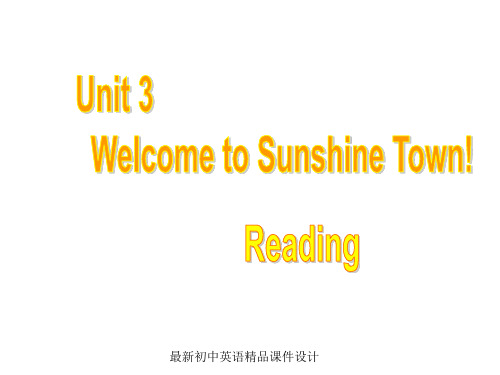
3. 我知道一家很好的意大利餐馆,离 这儿并不远。
I know a good Italian restaurant.
最新初中英语精品课件设计
Words review
quiet air
fresh local jogging underground famous
adj. 安静的;寂静的 n. 空气,大气 adj. 新鲜的 adj. 本地的,当地的 n. 慢跑锻炼 n. 地铁 adj. 出名的,著名的
最新初中英语精品课件设计
最新初中英语精品课件设计
There are lots of nice _s_h_o_p_s in Sunshine Town. We can buy some _w_o_n_d__er_f_u_l and not expensive presents there. There are many Chinese restaurants and _W__e_st_e_r_n_ restaurants in the town. You can also enjoy Beijing opera and learn more about Chinese _a_r_t_ in Sunshine Town.
最新初中英语精品课件设计
It takes only 40 minutes by underground. 乘地铁只需花40分钟。
句型it takes (somebody) some time to do something表示“(某人)花费时间去做 某事”。如:
牛津译林版英语七下初中Unit3WelcometoSunshineTown!单元练习

初中英语译林牛津版七年级下册Unit3 Welcome to SunshineTown!单元练习一、听力(听力)(共20小题;共20分)听力部分 (20分)Ⅰ. 听句子, 根据所听内容选择图画。
每个句子读一遍。
(5分)Ⅷ.听句子,选择恰当的应答语。
每个句子读一遍。
(5分)6. A. Yes, it is. B. No, it is. C. Yes, this is.7. A. No, that's my key. B. Yes, it is. C. No, it is.8. A. It's a watch. B. This is a ring. C. No, it isn't.9. A. SCHOOL. B. It's a school. C. Yes, it is.10. A. Yes, it isn't. B. Yes, it is. C. No, this isn't.Ⅷ. 听对话,选择正确答案。
对话读两遍。
(5分)11. Is this John's watch?A. Yes, it is.B. No, it isn't.C. It's Mary's watch.12. Is that Tim's baseball?A. Yes, it is.B. No, it isn't.C. We don't know.13. Whose (谁的) notebook is that?A. Jane's.B. David's.C. Tom's.14. Is this ruler Mary's?A. Yes, it is.B. No, it's Bill's.C. We don't know.15. Whose key is it?A. Tony's.B. Jack's.C. We don't know.Ⅷ. 听一段长对话,完成下面的表格。
牛津译林版七年级英语下册《Unit3WelcometoSunshineTownReading2》教案

《Unit 3 Welcome to Sunshine Town Reading 2》教案年级七年级科目英语课题7B Unit 3 Welcometo Su nshine TownReading 2课时 1 课型new 授课时间教学目标1 To grasp the expression about the text.2 To train the Ss comprehension ability重点To retell the passa ge with Ss’s own words.难点To retell the passage with Ss’s own words.教学准备Multimedia;教学设计详案二次备课内容Step One Warming up1.How far is Su nshine Town from the centre of Beijing?2.What can you see and do in Sunshine Park?3.Why do most of the students like living in tall buildings?4.When does the Star Shopping Mall close everyday?5.Are there any Western restaurants in Sunshine Town?Step Two Entering1.Ask one or two students to say s th about Sunshine Town.2.Rwad the passages together.3.Translate the passages.Step Three Language points.1.There’s less air pollu tion in Sunshine Town than in other areasof Beijing.le ss``````than```````“比``````少”反意短语为“more`````than”less是little的比较级,more是much many 的比较级than是比较级的标志eg: I know more English than you, but I know less maths than you.Millie is taller than L ily.2.Most of us live in tall buildings.most of us 我们中的大多数扩展:some of ``````,one of``````````eg: Most of the students like playing computer games.Some of them like playing football.One of you is a monitor.3.Here is such a tall building.Such + a /an +形容词+可数名词单数一个如此`````的eg: He is such a smart boy.It’s such a beautiful flower.注意区别:soHe is so smart a boy. So many flower.4.We like it because we are close to out friends.be close to 与``````关系好,离``````近,区别close /kleg: The shop clos es at ten every evening.On Sunday, the shop is closed.We are close friends.She studies in thi s school because she is close to it.5.We don’t have to go far if we want help with our homework. have to 不得不强调因客观条件的制约而不得不去做某事。
- 1、下载文档前请自行甄别文档内容的完整性,平台不提供额外的编辑、内容补充、找答案等附加服务。
- 2、"仅部分预览"的文档,不可在线预览部分如存在完整性等问题,可反馈申请退款(可完整预览的文档不适用该条件!)。
- 3、如文档侵犯您的权益,请联系客服反馈,我们会尽快为您处理(人工客服工作时间:9:00-18:30)。
Unit3 Welcome to Sunshine Town单元测试卷(满分:100)一、听力(每题1分,共10分)A. 听对话回答问题。
(听两遍) (每题1分,共4分)( )1. What will Nick do in the evening?A. B. C.( )2. What is the boy going to do?A. B. C.( )3. What does Jack’s pet like eating?A. B. C.( )4. Which season does Mike like best?A. B. C.B. 听短文,回答问题。
(听两遍) (每题1分,共6分)听第一篇短文,回答第5-6小题,以完成信息记录表。
(( )6. A. 87935341 B. 87953314 C. 87953341听第二篇短文,回答第7-10小题。
( )7. Why do most of the students live in flats in Sunshine Town?A. Because they want to live with their parents.B. Because they like living in tall buildings.C. Because they can help with each other.( )8. How long does it take to get to the centre of Beijing by underground?A. Half an hour.B. Forty minutes.C. An hour.( )9. Where can people go if they want to see hills and lakes in Sunshine Town?A. A new town in Beijing.B. The country park.C. Star Shopping Mall. ( )10. What can’t they do in Sunshine Town?A. Watch Beijing Opera.B. Buy souvenirs.C. Visit the World Park.二、单项选择(每题1分,共15分)( )1. —Would you like to go shopping with me?—Good idea. ________ go.A. Let usB. Let’sC. Let meD. Let we( )2. These oranges are very ________. I want to buy two kilos.A. freshB. thirstyC. dirtyD. expensive( )3. —Oh, dear. I can’t find ________ umbrella (雨伞). Can I share one with you?—Of course. ________ is a big one.A. yours; myB. your; mineC. my; mineD. mine; my( )4. —What do you think of your Chinese teacher?—I love her. She is really ________. She always has a smile on her face.A. friendlyB. funnyC. politeD. happy( )5. —________ is it from your school to the zoo?—It’s about six miles.A. How muchB. How manyC. How longD. How far( )6. There is ________ in the fridge. Can you buy some?A. anythingB. everythingC. nothingD. something( )7. This is ________ bedroom. The twin sisters like it very much.A. Lily and LucyB. Lily’s and Lucy’sC. Lily’s and LucyD. Lily and Lucy’s( )8. —________ try some Guangdong food for dinner today?—Good idea. Guangdong food tastes nice, too.A. Why notB. Why not toC. Why not youD. Why not we ( )9. It takes him one hour ________ TV every day.A. watchB. watchesC. to watchingD. to watch( )10. The dish smells ________ and you’d better throw it away.A. goodB. wellC. badD. badly( )11. Jack isn’t here now. He ________ later.A. comesB. is comingC. comingD. come( )12. —Does the house at the foot of the hill belong to ________?—No. It’s not ________. They don’t live in this area.A. their; theirsB. them; theirsC. theirs; theirsD. them; their ( )13. Mary looks forward to ________ a new iPad.A. getB. getsC. gotD. getting( )14. Boys and girls, I’m your guide (导游). I’m going to show you ________ the zoo.A. onB. offC. aroundD. out( )15. —Let’s go to the supermarket.—________. I am having breakfast.A. Wait a minuteB. Let’s goC. Of courseD. I’m sure三、完形填空(每题1分,共10分)Sydney is not the capital of Australia, but it’s the biggest and most famous city. It’s a ___1____ city, only about 200 years old. And about four ____2___ people live there. That’s about one fifth of the population of the whole ___3____.Sydney is a beautiful city. The climate (气候) there is very good. It’s not too ___4____ in winter and not too hot in summer. The sky is ___5____ blue. There are many interesting places in the city. Every year, many people from all over the world go to Sydney on ___6____. Many people think Sydney is one of the most beautiful cities in the world. It has many tall and modern ___7____. Sydney is famous for its seas and harbours (港口). It has many bays (湾) and beautiful ___8____. Sydney Harbor is is not only beautiful, but also very ___9____. Many ships carry wool, wheat (小麦) and meat from Sydney to other countries.The people living in Sydney have a(n) __10____ life style. They often say, “Don’t worry.” or “No hurry.” They are friendly. When they are not working, they love to have a good time on the beaches and enjoy life.( )1. A. big B. small C. young D. far( )2. A. million B. thousand C. hundred D. millions( )3. A. town B. country C. city D. place( )4. A. warm B. cool C. hot D. cold( )5. A. sometimes B. never C. usually D. at times( )6. A. summer B. holiday C. winter D. weekend( )7. A. buildings B. roads C. museums D. gardens( )8. A. hills B. rivers C. mountains D. beaches( )9. A. quiet B. busy C. new D. long( )10. A. hard B. difficult C. strange D. easy四、阅读理解(每题1分,共10分)A( )1. Miss Brown wants to see a film at 8.30 p.m., she can call ________.A. 010-6699 6644B. 010-6697 3219C. 010-6699 9977D. 010-6699 3834( )2. I am a member of Sunshine Theatre, I will pay ________ when I watch a play there.A. ¥15B. ¥20C. ¥30D. ¥40( )3. Mrs Wang will go to Sunshine Modern Cinema for a film with her 65-year-old father and her 13-year-old little son, she should pay ________.A. ¥80B. ¥90C. ¥110D. ¥120( )4. If you go to Sunshine Cinema on Tuesday, you’ll pay ________.A. ¥10B. ¥20C. ¥40D. ¥50( )5. Which of the following is right from the passage?A. You can go to Sunshine Theatre on Mondays at 10.30 a.m.B. The old c an only pay ¥10 when they go to Sunshine Cinema.C. You can call 010-6699 6644 if you want to watch a play.D. Sunshine Modern Cinema is open from 10.00 a.m.-11.30 p.m. at weekends.BDaniel is one of the exchange students from Britain. He is in a new school in China this term. And he is writing to his parents in his new school now. He tells his parents that his new school is big and nice. There are one thousand and four hundred students, one hundred and forty teachers in his school. He likes the teachers. They are very kind to him. His classmates are friendly and become his friends. The teachers and classmates teach him Chinese and he teaches them English.There’re trees, flowers and green grass in his new school. They’re very beautiful. Behind his school there’s a small river. There’s no pollution in it. The water in it is quite clean. They can swim in it in summer when it’s hot.They have no classes on Saturdays or Sundays. Sometimes he goes to play football or basketball with his classmates. Sometimes he stays at school and watch TV in the classroom. Sometimes he goes to shops with his friends, Tommy and Helen. They all like China.( )6. Daniel is studying and living in a ________ school now.A. EnglishB. ChineseC. smallD. Japanese( )7. There are ________ students and ________ teachers in Jack’s school.A.1,400; 104B.1,040; 104C.1,400; 140D. 1,040; 140( )8. Daniel’s teachers ________.A. teach him EnglishB. are friendly to himC. don’t like him at allD. are good to him ( )9. Daniel ________ his new classmates.A. don’t get on well withB. don’t likeC. makes good friends withD. is going to learn English from( )10. Which is right according to the passage?A. Daniel goes to school every day.B. Daniel doesn’t have classes every day.C. Daniel has no classes only on Saturdays.D. Daniel has no classes only on Sundays.五、词汇(每题1分,共15分)A) 请根据句意及汉语提示,写出所缺单词。
